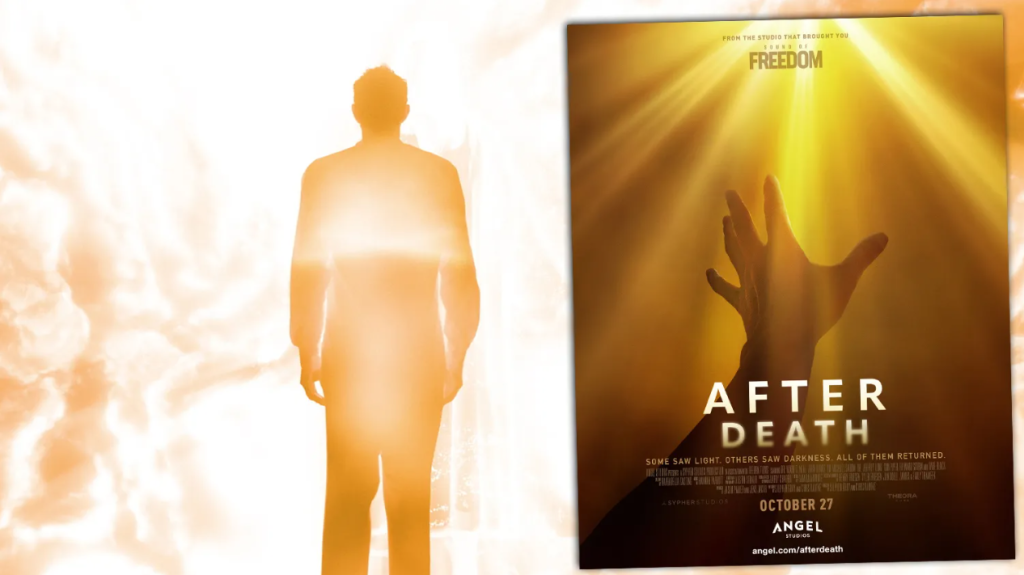‘After Death’ is a thought-provoking documentary that delves into the phenomenon of near-death experiences (NDEs) and the profound impact they have on individuals who have encountered them. Directed by acclaimed filmmaker, the documentary offers a compelling exploration of the afterlife, bridging the gap between science, spirituality, and personal accounts. In this review, we delve into the film’s narrative, visuals, and overall impact, unraveling the captivating stories of those who have glimpsed the other side.

Narrative and Structure
‘After Death’ takes a comprehensive approach to its subject matter, presenting a well-structured narrative that combines scientific research, interviews, and personal stories. The film seamlessly weaves together various perspectives, including renowned scientists, medical professionals, and individuals who have experienced NDEs. This multi-dimensional approach provides a balanced and engaging exploration of the topic, allowing viewers to gain insights into the nature of consciousness, life after death, and the transformative power of NDEs.
Visuals and Cinematography
Visually, ‘After Death’ is a stunning documentary that captivates the audience from start to finish. The film incorporates breathtaking landscapes, celestial imagery, and ethereal animations to create a sense of wonder and intrigue. The cinematography is skillfully executed, with sweeping shots and intimate close-ups that enhance the emotional impact of the interviews and personal accounts. The visual elements complement the narrative, evoking a sense of the mystical and transcendent nature of the subject matter.
Personal Accounts and Emotional Resonance
One of the film’s strengths lies in its inclusion of personal accounts from individuals who have had NDEs. These firsthand testimonies provide a deeply personal and emotional dimension to the documentary. Through candid interviews, the participants recount their encounters with death, describing vivid visions, feelings of peace, and encounters with deceased loved ones. Their stories evoke a range of emotions, from awe and wonder to fear and existential contemplation, leaving a lasting impact on viewers.

Scientific Perspectives and Skepticism
‘After Death’ strikes a balance between personal experiences and scientific viewpoints. Renowned scientists and medical professionals provide valuable insights into the phenomenon of NDEs, exploring potential explanations rooted in neurobiology, psychology, and consciousness studies. The documentary also addresses skepticism and critical analysis, acknowledging the need for further scientific research and understanding in this complex field. By presenting multiple perspectives, the film encourages viewers to engage critically with the subject matter while remaining open to the mysteries that surround it.
Philosophical and Spiritual Reflections
Beyond the scientific and personal dimensions, ‘After Death’ delves into philosophical and spiritual reflections on the nature of existence and the afterlife. The documentary raises questions about the purpose of life, the interconnectedness of all beings, and the potential implications of NDEs for our understanding of consciousness. Through thought-provoking dialogue and introspection, the film invites viewers to contemplate their own beliefs and perceptions, fostering a sense of curiosity and wonder about the mysteries that lie beyond our mortal existence.
Impact and Takeaways
‘After Death’ leaves a lasting impact on its audience by offering a compelling exploration of NDEs and their transformative effects. The documentary challenges preconceived notions about death and encourages viewers to reflect on the nature of consciousness and the possibilities beyond our mortal lives. It serves as a catalyst for deep introspection, fostering discussions on spirituality, science, and the interconnectedness of all living beings. ‘After Death’ is a thought-provoking and soul-stirring documentary that invites viewers to contemplate the profound mysteries that lie at the brink of life and death.

There are a some of the scientific explanations for near-death experiences mentioned in the documentary. It is important to note that while these scientific explanations provide insights into the mechanisms behind NDEs, they do not fully explain the profound and transformative nature of these experiences. The documentary acknowledges the limitations of scientific understanding and encourages viewers to consider the potential interplay between scientific explanations and the mysteries of consciousness and the afterlife.
Neurobiological Explanations
The documentary highlights neurobiological explanations for NDEs, suggesting that these experiences may be a result of brain activity during times of crisis or trauma. One theory is the “dying brain hypothesis,” which proposes that NDEs are a product of neurochemical changes that occur when the brain is deprived of oxygen. These changes can lead to a cascade of hallucinatory experiences, vivid imagery, and altered states of consciousness.

Psychological Factors
Psychological factors are also considered in understanding NDEs. The film explores how the mind copes with the fear of death and the existential questions it raises. Psychological defense mechanisms, such as dissociation or depersonalization, may play a role in creating a sense of detachment from the physical body and facilitating the transcendent experiences reported in NDEs.
Consciousness Studies
The documentary touches upon the field of consciousness studies and its relevance to NDEs. Scientists and researchers in this field explore the nature of consciousness and its relationship to the brain. Some theories suggest that consciousness may extend beyond the physical body, offering the possibility of transcendent experiences during NDEs.
Endorphin and Serotonin Release
The release of endorphins and serotonin, neurotransmitters associated with feelings of euphoria and well-being, is another scientific explanation discussed in the film. During extreme stress or trauma, the brain may release these chemicals, leading to positive emotions and blissful sensations reported by individuals who have had NDEs.
Perception and Memory
The documentary also delves into the role of perception and memory in NDEs. Research suggests that during times of crisis, the brain’s perception and processing of sensory information may become altered. This can result in the distortion of time, enhanced sensory experiences, and the formation of vivid memories that contribute to the richness of NDEs.

‘After Death’ is a remarkable documentary that navigates the realms of science, spirituality, and personal experiences, shedding light on the enigmatic phenomenon of near-death experiences. Through its compelling narrative, stunning visuals, and emotional resonance, the film invites viewers to explore the mysteries of the afterlife and contemplate the profound implications of NDEs. ‘After Death’ is a captivating exploration of the human condition and the timeless questions that have fascinated humanity for centuries